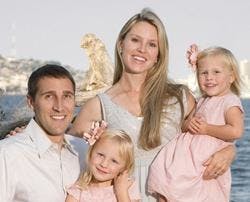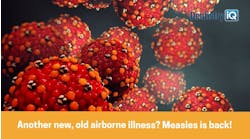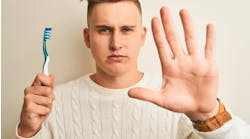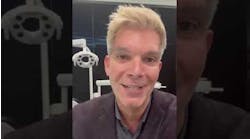April 29, 2014
When Erin Pocuis started visiting her grandfather in an assisted living center, she noticed he wasn’t getting the dental care he needed.
“He was living in an assisted living facility and had Alzheimer’s and dementia, so I started going in and cleaning his teeth. That’s when I noticed there was a huge need for it.”
States with the best (and worst) adult oral health care
Luckily for Erin’s family and other homebound patients suffering from oral health issues, the Washington state government also noticed there was a need for people like her. On May 1, 2013, Gov. Jay Inslee signed into law HB 1330, which allows dental hygienists and dental assistants to provide certain services under the general supervision of a dentist. Under the law, dental hygienists are able to provide dental care to homebound patients. By September of the same year, Erin had started Cascade Hygiene, her mobile hygiene service company.
“I worked in a private practice, saved up money, invested in an express unit, and went to the facility where my grandfather had lived and asked if they wanted me to provide hygiene services.” It wasn’t surprising that the caregivers at the facility were accepting of it, Erin told me. “Word got around and now I’m going to a few different facilities.”
Adhering to the law
Although Erin intensively researched the laws she would be adhering to as a mobile hygienist, there was a lot of paperwork that she didn’t foresee. “I wish I could just pack up and do my cleanings, but it’s a lot of work to follow the law to the letter.” Erin works part-time at a dental office and spends the rest of her time helping homebound patients. Luckily, she is able to operate under the general supervision of the dentist she works for part-time.
“A lot of the time, patients have issues, and we can bring them to our private practice dentists. It’s hard to get them in there, physically, but sometimes they really need it.” Erin knows the law is there to protect the patients and the hygienists, but she feels confident in her abilities as a hygienist. She has, after all, been working as a registered hygienist for 10 years. “I suppose if you had a question or a concern, the state wants you to be able to have someone to help,” she added.
Despite her credentials and abilities to work “in the field,” Erin is limited to the guidelines provided in the law. “Patients really have to have limited access to care. I can’t work on someone who can hop in a car and drive to a dental office. It’s a great population to treat, because Washington is a rural state; there are fewer dentists, fewer everything.” Erin attributes Washington’s support of mobile hygienists to the amount of dental health professional shortage areas in the state. “Now we can get out there and provide care to the people who wouldn’t have it otherwise.”
INFOGRAPHIC: In search of dental care
Bad business for dentists?
Erin says the dentist she works for was very supportive of her getting a business license and taking her cleanings to homebound patients. “It means more flexibility for me, which is great because we’re a busy practice with a few hygienists, but it also means more patients for them that they wouldn’t have gotten otherwise.” Erin refers patients who need more than a cleaning to her dentist — or other dentists in the patient’s area. “So far, they’ve been accepting and helpful and are just as happy to help as I am. They realize there’s a need they’re not able to fill.”
“It’s not a competition,” she adds. “It’s daunting to know how many more people are in need. I hope I can keep this going and get the word out to help people who didn’t know it was an option.”
Expanding the role of a dental hygienist and other midlevel providers is a controversial topic in dentistry, but Erin thinks people may be missing the point. “We’re trying to help people. Hygienists aren’t making a ton of money, so that’s not why we’re doing it. It’s to help people feel better, and where there’s a need, we should be able to work at the highest of our licensure.
“It’s really disappointing for the community. It’s a missed opportunity, in my opinion.”
The patient experience
Erin confirms that there aren’t any services her hygiene patients are missing out on when she works in the field, but she is confident that her homebound patients are getting better service through Cascade Hygiene. “It’s nice to make your own hours and be able to provide the care that you believe the patient needs and give them the time you believe they need. I can do what I feel is right for the patient, and that’s the most important thing.
“So many private practices are based off production. They’re losing sight of the patient and what’s important, and it’s devastating to my career.”
And while Erin can’t accept dental insurance because of low reimbursement rates, she says that patients aren’t affected. “Most of them don’t have dental insurance anyway. My fees are low because I don’t have the same expenses as a dentist operating a practice, but I still want my patients to understand the value behind the cost [which is usually $50 to $100 per cleaning].
“We can’t undercut our profession; I think that’s really important. The last thing I want to do is focus on a lower fee. Hygienists undercutting each other won’t do anyone any favors — and it’s unethical.”
Future plans
Erin plans to start treating children in the future. “There are all these young people who have families that are so overwhelmed with their disabilities and focused on their day-to-day care that dental care falls by the wayside. I’d like to help kids and build that relationship right off the bat.”
Although she can see the rewards in others’ lives, branching out isn’t easy.
“There’s a learning curve. I’m just getting into this and trying to figure out how to market, but I think success follows when you like what you’re doing.”
To find out more about Cascade Hygiene, visit her website, cascadehygiene.com.








